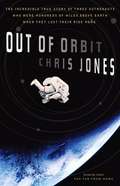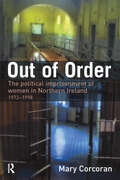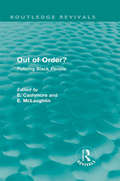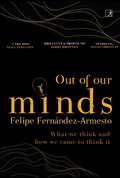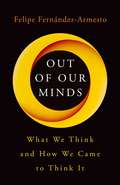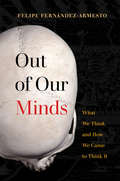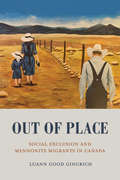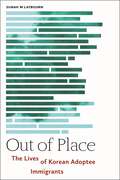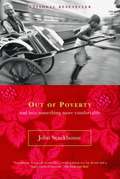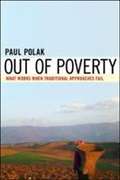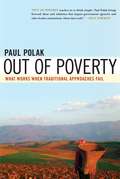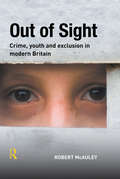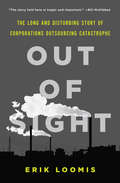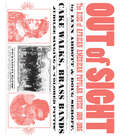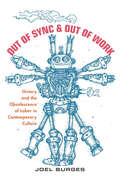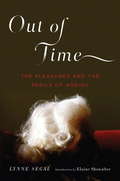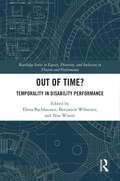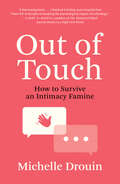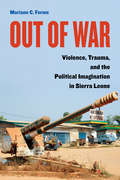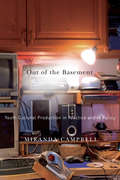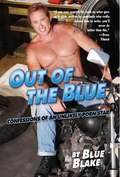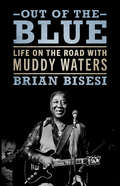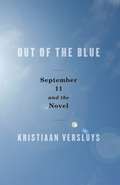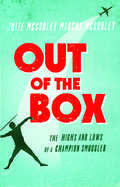- Table View
- List View
Out of Orbit: The True Story of How Three Astronauts Found Themselves Hundreds of Miles Above the Earth with No Way Home
by Chris JonesAn adventure set on the most dangerous frontier of all--outer space. In the nearly forty years since Neil Armstrong walked on the moon, space travel has come to be seen as a routine enterprise--at least until the shuttle "Columbia" disintegrated.
Out of Order
by Mary CorcoranThis book provides a comprehensive account of the imprisonment of women for politically motivated offences in Northern Ireland between 1972 and 1999. Women political prisoners were engaged in a campaign to obtain formal recognition as political prisoners, and then to retain this status after it was revoked. Their lengthy involvement in a prison conflict of international significance was notable as much because of its longevity as the radical aspects of their prison protests, which included hunger strikes, dirty-protests and campaigns against institutional abuses. Out of Order brings out the qualitatively distinctive character and punitive ethos of regimes of political imprisonment for women, exploring the dynamics of their internal organisation, the ways in which they subverted order and security in prison, and their strategies of resistance and exploitation. Drawing upon a wide range of first hand accounts and interviews this book brings together perspectives from the areas of political imprisonment, the penal punishment of women and the question of agency and resistance in prison to create a unique, highly readable study of a neglected subject.
Out of Order?: Policing Black People (Routledge Revivals)
by E. Cashmore E. McLaughlinFirst published in 1991, this book evaluates and compares the problematic relationships that have sometimes existed between police and Afro-Caribbean people in Britain and in the United States of America. Contributors from both sides of the Atlantic assess conflicting claims from police and black communities, as to whether some police are racist or too brutal in their operations. Although this book was written in the early 90s, many of the issues discussed remain interesting and relevant to our society today.
Out of Our Minds: A History of What We Think and How We Think It
by Mr. Felipe Fernández-ArmestoTO IMAGINE — to see that which is not there — is the startling ability that has fuelled human development and innovation through the centuries. As a species we stand alone in our remarkable capacity to refashion the world after the pictures in our minds. Traversing the realms of science, politics, religion, culture, philosophy and history, Felipe Fernández-Armesto reveals the thrilling and disquieting tales of our imaginative leaps — from the first Homo Sapiens to the present day. Through groundbreaking insights in cognitive science, he explores how and why we have ideas in the first place, providing a tantalising glimpse into who we are and what we might yet accomplish. Fernández-Armesto shows that bad ideas are often more influential than good ones; that the oldest recoverable thoughts include some of the best; that ideas of Western origin often issued from exchanges with the wider world; and that the pace of innovative thinking is under threat.
Out of Our Minds: What We Think and How We Came to Think It
by Felipe Fernández-Armesto&‘Immensely learned and ambitious…seam-bursting eclecticism and polymathic brio… This is by any standards a significant book and its author deserves high praise.&’ Literary ReviewTo imagine – to see that which is not there – is the startling ability that has fuelled human development and innovation through the centuries. As a species we stand alone in our remarkable capacity to refashion the world after the pictures in our minds. Traversing the realms of science, politics, religion, culture, philosophy and history, Felipe Fernández-Armesto reveals the thrilling and disquieting tales of our imaginative leaps. Through groundbreaking insights in cognitive science, he explores how and why we have ideas in the first place, providing a tantalising glimpse into who we are and what we might yet accomplish. Fernández-Armesto shows that bad ideas are often more influential than good ones; that the oldest recoverable thoughts include some of the best; that ideas of Western origin often issued from exchanges with the wider world; and that the pace of innovative thinking is under threat.
Out of Our Minds: What We Think and How We Came to Think It
by Felipe Fernández-ArmestoTo imagine—to see what is not there—is the startling ability that has fueled human development and innovation through the centuries. As a species we stand alone in our remarkable capacity to refashion the world after the picture in our minds. Traversing the realms of science, politics, religion, culture, philosophy, and history, Felipe Fernández-Armesto reveals the thrilling and disquieting tales of our imaginative leaps—from the first Homo sapiens to the present day. Through groundbreaking insights in cognitive science, Fernández-Armesto explores how and why we have ideas in the first place, providing a tantalizing glimpse into who we are and what we might yet accomplish. Unearthing and historical evidence, he begins by reconstructing the thoughts of our Paleolithic ancestors to reveal the subtlety and profundity of the thinking of early humans. A masterful paean to the human imagination from a wonderfully elegant thinker, Out of Our Minds shows that bad ideas are often more influential than good ones; that the oldest recoverable thoughts include some of the best; that ideas of Western origin often issued from exchanges with the wider world; and that the pace of innovative thinking is under threat.
Out of Place: Social Exclusion and Mennonite Migrants in Canada
by Luann Good GingrichThe flow of migrants from south to north and east to west carries with it growing concerns about the economic integration, political incorporation, and social inclusion of newcomers and their children. But what happens when a group of people deliberately excludes themselves from mainstream society? How can social policies, human services, and communities best understand and respond to them? In Out of Place, Luann Good Gingrich explores social inclusion and exclusion in relation to the approximately 60,000 Low German-speaking Mennonites who have migrated from traditionally self-sufficient and agrarian colonies in Latin America to rural areas of Canada. By examining the free-market principles that organize the human services industry the author exposes the inherent conflict that arises when this "market logic" is imposed on a group that does not embrace these ideals. The author's innovative approach to social policy and human services which emphasizes the relationship between dominant and subordinate cultures, encourages us to find new ways to authentically engage with difference and bridge the gaps that divide us.
Out of Place: The Lives of Korean Adoptee Immigrants (Asian American Sociology #3)
by SunAh M LaybournHow Korean adoptees went from being adoptable orphans to deportable immigrantsSince the early 1950s, over 125,000 Korean children have been adopted in the United States, primarily by white families. Korean adoptees figure in twenty-five percent of US transnational adoptions and are the largest group of transracial adoptees currently in adulthood. Despite being legally adopted, Korean adoptees' position as family members did not automatically ensure legal, cultural, or social citizenship. Korean adoptees routinely experience refusals of belonging, whether by state agents, laws, and regulations, in everyday interactions, or even through media portrayals that render them invisible. In Out of Place, SunAh M Laybourn, herself a Korean American adoptee, examines this long-term journey, with a particular focus on the race-making process and the contradictions inherent to the model minority myth.Drawing on in-depth interviews with Korean adoptee adults, online surveys, and participant observation at Korean adoptee events across the US and in Korea, Out of Place illustrates how Korean adoptees come to understand their racial positions, reconcile competing expectations of citizenship and racial and ethnic group membership, and actively work to redefine belonging both individually and collectively. In considering when and how Korean adoptees have been remade, rejected, and celebrated as exceptional citizens, Out of Place brings to the fore the features of the race-making process.
Out of Poverty: And Into Something More Comfortable
by John StackhouseIn an intriguing blend of travel writing and analysis, moving portraits and comic tales, Stackhouse tells the personal stories of some of the world's poorest people and shows how they are going to end global poverty in the next century. He provides haunting details of lives and communities destroyed by misplaced aid and government interventions. But more importantly he shows how individuals are finding the creativity and means to make their own lives better. Time and again, Stackhouse sees what happens when people have a say in the fate of their schools, forests, fields and governments: they do what no development agency or government mega-project has been able to achieve. They thrive. They may continue to be humble but they are no longer desperate. John Stackhouse's eight-year journey among the poor leads us away from despair. Poverty, he writes, is not an inevitable part of the human condition but a direct result of human actions - and something that can be remedied.
Out of Poverty: What Works When Traditional Approaches Fail
by Paul PolakPolak explodes what he calls the "Three Great Poverty Eradication Myths": that we can donate people out of poverty, that national economic growth will end poverty, and that Big Business, operating as it does now, will end poverty.
Out of Poverty: What Works When Traditional Approaches Fail (Bk Currents Ser.)
by Paul PolakBased on his 25 years of experience, Polak explodes what he calls the "Three Great Poverty Eradication Myths": that we can donate people out of poverty, that national economic growth will end poverty, and that Big Business, operating as it does now, will end poverty. Polak shows that programs based on these ideas have utterly failed--in fact, in sub-Saharan Africa poverty rates have actually gone up. These failed top-down efforts contrast sharply with the grassroots approach Polak and IDE have championed: helping the dollar-a-day poor earn more money through their own efforts. Amazingly enough, unexploited market opportunities do exist for the desperately poor. Polak describes how he and others have identified these opportunities and have developed innovative, low-cost tools that have helped in lifting 17 million people out of poverty.
Out of Sight
by Robert McAuleyYouth crime is simultaneously a social problem and an intrinsic part of consumer culture: while images of gangs and gangsters are used to sell global commodities, young people not in work and education are labelled as antisocial and susceptible to crime. This book focuses on the lives of a group of young adults living in a deprived housing estate situated on the edge of a large city in the North of England. It investigates the importance of fashion, music and drugs in young people's lives, providing a richly detailed ethnographic account of the realities of exclusion, and explaining how young people become involved in crime and drug use. Young men and women describe their own personal experiences of exclusion in education, employment and the public sphere. They describe their history of exclusion as 'the life', and the term identifies how young people grew up as objects of suspicion in the eyes of an affluent majority. While social exclusion continues to be seen as a consequence of young people's behaviour, Out of Sight: crime, youth and exclusion in modern Britain examines how stigmatising poor communities has come to define Britain's consumer society. The book challenges the view underlying government policy that social exclusion is a product of crime, antisocial behaviour and drug use, and in focusing on one socially deprived neighbourhood it promotes a different way of seeing the problematic relationship between socially excluded young people, society and government.
Out of Sight: The Long and Disturbing Story of Corporations Outsourcing Catastrophe
by Erik LoomisA provocative analysis of labor, globalization, and environmental harm by the award-winning historian and author of A History of America in Ten Strikes. In the current state of our globalized economy, corporations have no incentive to protect their workers or the environment. Jobs moves seamlessly across national borders while the laws that protect us from rapacious behavior remain bound by them. As a result, labor exploitation and toxic pollution remain standard practice. In Out of Sight, Erik Loomis—a historian of both the labor and environmental movements—follows a narrative that runs from the 1911 Triangle Shirtwaist Factory fire in New York City to the collapse of the Rana Plaza factory outside of Dhaka, Bangladesh, in 2013. He demonstrates that our modern systems of industrial production are just as dirty and abusive as they were during the Industrial Revolution and the Gilded Age. The only difference is that the ugly side of manufacturing is now hidden in faraway places where workers are most vulnerable. In this Choice Outstanding Academic Title, Loomis shows that the great environmental victories of twentieth-century America—the Clean Water Act, the Clean Air Act, the EPA—were actually union victories. Using this history as a call to action, Out of Sight proposes a path toward regulations that follow corporations wherever they do business, putting the power back in workers&’ hands. &“The story told here is tragic and important.&” —Bill McKibben &“Erik Loomis prescribes how activists can take back our country—for workers and those who care about the health of our planet.&” —Senator Sherrod Brown (D-OH)
Out of Sight: The Rise of African American Popular Music, 1889–1895 (American Made Music Series)
by Lynn Abbott Doug SeroffA landmark study, based on thousands of music-related references mined by the authors from a variety of contemporaneous sources, especially African American community newspapers, Out of Sight examines musical personalities, issues, and events in context. It confronts the inescapable marketplace concessions musicians made to the period’s prevailing racist sentiment. It describes the worldwide travels of jubilee singing companies, the plight of the great Black prima donnas, and the evolution of “authentic” African American minstrels. Generously reproducing newspapers and photographs, Out of Sight puts a face on musical activity in the tightly knit Black communities of the day. Drawing on hard-to-access archival sources and song collections, the book is of crucial importance for understanding the roots of ragtime, blues, jazz, and gospel. Essential for comprehending the evolution and dissemination of African American popular music from 1900 to the present, Out of Sight paints a rich picture of musical variety, personalities, issues, and changes during the period that shaped American popular music and culture for the next hundred years.
Out of Sync & Out of Work: History and the Obsolescence of Labor in Contemporary Culture
by Joel BurgesOut of Sync & Out of Work explores the representation of obsolescence, particularly of labor, in film and literature during a historical moment in which automation has intensified in capitalist economies. Joel Burges analyzes texts such as The Invention of Hugo Cabret, Wreck-It Ralph, Fantastic Mr. Fox, and Iron Council, and examines their “means” of production. Those means include a range of subjects and narrative techniques, including the “residual means” of including classic film stills in a text, the “obstinate means” of depicting machine breaking, the “dated means” of employing the largely defunct technique of stop-motion animation, and the “obsolete” means of celebrating a labor strike. In every case, the novels and films that Burges scrutinizes call on these means to activate the reader’s/viewer’s awareness of historical time. Out of Sync & Out of Work advances its readers’ grasp of the complexities of historical time in contemporary culture, moving the study of temporality forward in film and media studies, literary studies, critical theory, and cultural critique.
Out of Time
by Elaine Showalter Lynne SegalA brave book with a polemical argument on the paradoxes, struggles and advantages of aging.How old am I? Don't ask, don't tell. As the baby boomers approach their sixth or seventh decade, they are faced with new challenges and questions of politics and identity. In the footsteps of Simone de Beauvoir, Out of Time looks at many of the issues facing the aged--the war of the generations and baby-boomer bashing, the politics of desire, the diminished situation of the older woman, the space on the left for the presence and resistance of the old, the problems of dealing with loss and mortality, and how to find victory in survival.
Out of Time?: Temporality In Disability Performance (Routledge Series in Equity, Diversity, and Inclusion in Theatre and Performance)
by Elena BackhausenOut of Time? has many different meanings, amongst them outmoded, out of step, under time pressure, no time left, or simply delayed. In the disability context, it may also refer to resistant attitudes of living in “crip time” that contradict time as a linear process with a more or less predictable future. According to Alison Kafer, “crip time bends the clock to meet disabled bodies and minds.” What does this mean in the disability arts? What new concepts of accessibility, crip futures, and crip resistance can be staged or created by disability performance? And how does the notion of “out of time” connect crip time with pandemic time in disability performance? The collective volume seeks to respond to these questions by exploring crip time in disability performance as both a concept and a phenomenon. The book tackles the topic from two angles: on the one hand from a theoretical point of view that connects performance analysis with crip and performance theory, on the other hand from a practice-based perspective of disability artists who develop new concepts and dramaturgies of crip time based on their own lived experiences and observations in the field of the performing and disability arts. The book gathers different types of text genres, forms, and styles that mirror the diversity of their authors. Besides theoretical and academic chapters on disability performance, the book also includes essays, poems, dramatic texts, and choreographic concepts that ref lect upon the alternative knowledge in the disability arts.
Out of Touch: How to Survive an Intimacy Famine
by Michelle DrouinA behavioral scientist explores love, belongingness, and fulfillment, focusing on how modern technology can both help and hinder our need to connect.Millions of people around the world are not getting the physical, emotional, and intellectual intimacy they crave. Through the wonders of modern technology, we are connecting with more people more often than ever before, but are these connections what we long for? Pandemic isolation has made us even more alone. In Out of Touch, Professor of Psychology Michelle Drouin investigates what she calls our intimacy famine, exploring love, belongingness, and fulfillment and considering why relationships carried out on technological platforms may leave us starving for physical connection. Drouin puts it this way: when most of our interactions are through social media, we are taking tiny hits of dopamine rather than the huge shots of oxytocin that an intimate in-person relationship would provide. Drouin explains that intimacy is not just sex—although of course sex is an important part of intimacy. But how important? Drouin reports on surveys that millennials (perhaps distracted by constant Tinder-swiping) have less sex than previous generations. She discusses pandemic puppies, professional cuddlers, the importance of touch, &“desire discrepancy&” in marriage, and the value of friendships. Online dating, she suggests, might give users too many options; and the internet facilitates &“infidelity-related behaviors.&” Some technological advances will help us develop and maintain intimate relationships—our phones, for example, can be bridges to emotional support. Some, on the other hand, might leave us out of touch. Drouin explores both of these possibilities.
Out of War: Violence, Trauma, and the Political Imagination in Sierra Leone
by Mariane C. FermeOut of War draws on Mariane C. Ferme’s three decades of ethnographic engagements to examine the physical and psychological aftereffects of the harms of Sierra Leone's civil war. Ferme analyzes the relationship between violence, trauma, and the political imagination, focusing on “war times”—the different qualities of temporality arising from war. She considers the persistence of precolonial and colonial figures of sovereignty re-elaborated in the context of war, and the circulation of rumors and neologisms that freeze in time collective anxieties linked to particular phases of the conflict (or “chronotopes”). Beyond the expected traumas of war, Ferme explores the breaks in the intergenerational transmission of farming and hunting techniques, and the lethal effects of remembering experienced traumas and forgetting local knowledge. In the context of massive population displacements and humanitarian interventions, this ethnography traces strategies of survival and material dwelling, and the juridical creation of new figures of victimhood, where colonial and postcolonial legacies are reinscribed in neoliberal projects of decentralization and individuation.
Out of the Basement: Youth Cultural Production in Practice and in Policy
by Miranda CampbellSoulja Boy, Justin Bieber, and Tavi Gevinson are hardly representative of typical youth experiences, but their origins highlight many of the realities of youth doing independent creative work. Out of the Basement profiles the variety of youth cultural production in the twenty-first century, and asks what has - or has not - changed as youth attempt to make a living from creative works. Though any young person with a laptop might have greater means to make music, films, or publish writing than in the past, the skills necessary to make a living in today's creative industries are not taught in schools - young artists must find their own way out of their basements. Integrating cultural studies, media education, and subculture studies, Miranda Campbell profiles this process of navigation and negotiation - one largely overlooked in discussions of creative economies - through the life stories of young people who are building careers through cultural work. She considers how existing policies can impede small-scale cultural production and calls for more awareness and support of youth creative enterprise. Moving between the structures directed toward creative life and the initiatives that young people produce themselves in the absence of relevant structures, Out of the Basement offers a timely analysis of the rise of small-scale creative employment.
Out of the Basement: Youth Cultural Production in Practice and in Policy
by Miranda CampbellSoulja Boy, Justin Bieber, and Tavi Gevinson are hardly representative of typical youth experiences, but their origins highlight many of the realities of youth doing independent creative work. Out of the Basement profiles the variety of youth cultural production in the twenty-first century, and asks what has - or has not - changed as youth attempt to make a living from creative works. Though any young person with a laptop might have greater means to make music, films, or publish writing than in the past, the skills necessary to make a living in today's creative industries are not taught in schools - young artists must find their own way out of their basements. Integrating cultural studies, media education, and subculture studies, Miranda Campbell profiles this process of navigation and negotiation - one largely overlooked in discussions of creative economies - through the life stories of young people who are building careers through cultural work. She considers how existing policies can impede small-scale cultural production and calls for more awareness and support of youth creative enterprise. Moving between the structures directed toward creative life and the initiatives that young people produce themselves in the absence of relevant structures, Out of the Basement offers a timely analysis of the rise of small-scale creative employment.
Out of the Blue: Confessions of an Unlikely Porn Star
by Blue BlakeOut of the Blue is a hilarious autobiographical romp that details the life of porn star turned director/producer Blue Blake and his adventures in the skin trade. Blue has worked with every major star in the industry and won many major awards and honors, including induction into the Gay Porn Legend Hall of Fame.
Out of the Blue: Life on the Road with Muddy Waters (American Made Music Series)
by Brian BisesiOut of the Blue: Life on the Road with Muddy Waters begins with a moment lifted from a young musician’s dreams. Brian Bisesi, a guitarist barely out of his teens, is invited on stage to fill in for a missing member of the band backing blues legend Muddy Waters. This life-changing quirk of fate opens the door into a world of challenges and opportunities that Bisesi, an Italian American reared in the comforts of a New York City suburb, can barely imagine. Despite their differences, Bisesi and Waters hit it off, and what might have been a one-night stand turns into a career. From 1978 to 1980, Bisesi works for Waters as his road manager, bean-counter, and at times his confidant, while often sitting in with the band. Bisesi’s years with the band take him to Europe, Japan, Canada, and across the United States as Waters tours—and parties—with rock gods like Eric Clapton, the Rolling Stones, a Beatle, and the gamut of musicians who came of age with Waters and introduced a younger generation to the blues. In Out of the Blue, Bisesi captures it all: from the pranks and tensions among bluesmen enduring a hard life on the road, to observations about Waters’s technique, his love of champagne and reefer, his eye for women, and his sometimes-acrid views of contemporary music. Bisesi has sharp insights into the ill-conceived management decisions that led to the dissolution of Waters’s longest-serving band in June of 1980. This book will rivet, amuse, and occasionally infuriate blues aficionados. It is a raucous and intimate portrait of the blues scene at a pivotal moment in time that fascinates music historians and blues fans alike.
Out of the Blue: September 11 and the Novel
by Kristiaan VersluysWriters have represented 9/11 and its aftermath with varying degrees of success. In Out of the Blue, Kristiaan Versluys focuses on novels that move beyond patriotic clichés and cheap sensationalism and provide new insights into the emotional and ethical impact of these traumatic events-and what it means to depict them. Versluys focuses on Don DeLillo's Falling Man, Art Spiegelman's In the Shadow of No Towers, Jonathan Safran Foer's Extremely Loud and Incredibly Close, Frédéric Beigbeder's Windows on the World, and John Updike's Terrorist. He scrutinizes how these writers affirm the humanity of the disoriented individual, as opposed to the cocksure killer or politician, and retranslate hesitation, stuttering, or stammering into a precarious act of defiance. Versluys also discusses works by Ian McEwan, Anita Shreve, Martin Amis, and Michael Cunningham, arguing for the novel's distinct power in rendering the devastation of 9/11.
Out of the Box
by Julie Mcsorley Marcus McsorleyReg Spiers arrived in England in 1964 as a world-class athlete. He returned to Australia in a box, but that was only the start of his adventures. Crazily impulsive, romantic, and free-spirited, Reg became a national hero for smuggling himself 13,000 miles home as air freight. But as his fame and sporting career faded, Reg decided to smuggle something very different. Soon, he was on the run with his girlfriend, playing a cat-and-mouse game with police on three continents. A wild road trip across India and Africa-idyllic beaches and prison hellholes, shady friends and shadier cops, gun-toting militias and drug-running gangsters -led to a court room in Sri Lanka and the fight of his life. Could Reg beat the death sentence he’d just been given, or was this box too big to climb out of?
